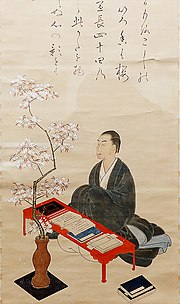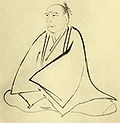Motoori Norinaga (本居 宣長, 21 June 1730 – 5 November 1801) was a Japanese scholar of Kokugaku active during the Edo period. He is conventionally ranked as...
17 KB (2,020 words) - 12:52, 27 September 2024
in the hands of Motoori Norinaga, who obtained a copy of the Kan'ei printed edition in 1754. After meeting Mabuchi in 1763, Norinaga began to devote his...
50 KB (6,255 words) - 18:38, 30 July 2024
in the late Edo period waka faced new trends from beyond the court. Motoori Norinaga, the great reviver of the traditional Japanese literature, attempted...
22 KB (2,544 words) - 19:33, 7 February 2024
44-volume commentary on the Kojiki written by the kokugaku scholar Motoori Norinaga. The Kojiki-den is a commentary on the Kojiki, an eighth-century work...
4 KB (373 words) - 01:08, 6 January 2024
philologist during mid-Edo period Japan. Along with Kada no Azumamaro, Motoori Norinaga, and Hirata Atsutane, he was regarded as one of the Four Great Men...
5 KB (514 words) - 04:20, 4 October 2023
Japanese definitions of the mitama, developed later by many thinkers like Motoori Norinaga, maintain it consists of several "spirits", relatively independent...
6 KB (759 words) - 21:58, 17 October 2024
philosophy. They are traditionally enumerated as: Kada no Azumamaro Kamo no Mabuchi Motoori Norinaga Hirata Atsutane Japanese definition 個人的には納得できない「国学の四大人...
767 bytes (70 words) - 04:21, 4 October 2023
University of Washington Press, 1964, pp. 66 ff. Motoori, Norinaga (2007). The Poetics of Motoori Norinaga: A Hermeneutical Journey Archived 3 July 2023...
84 KB (9,524 words) - 08:23, 7 November 2024
studies") or inishie manabi ("antiquity studies"), a term favored by Motoori Norinaga and his school. Drawing heavily from Shinto and Japan's ancient literature...
7 KB (792 words) - 16:51, 28 October 2024
Kokugaku, and student of the Japanese language. He was a first son of Motoori Norinaga. He was called Kenzo (健蔵) in childhood. Haruniwa followed his father...
2 KB (197 words) - 19:22, 10 October 2023



